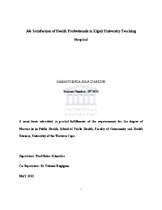| dc.description.abstract | Job satisfaction is important for the delivery of quality health care and health worker retention. This study aimed to identify the extent of job satisfaction among University Teaching Hospital of Kigali (UTHK) health workers and to describe the variables related to job satisfaction. These included working conditions, remuneration, patient care, development opportunities, supervision, time pressure and staff relations. A cross- sectional survey of UTHK health workers was conducted using a standardized instrument to identify health worker job satisfaction with related key work factors.
A self-administered questionnaire was used to collect data from 274 health workers selected using a proportional stratified random sampling method and which included 21 medical doctors, 159 nurses, 19 midwives, 37 paramedic and 37 administrative staff. Respondents provided written consent to participate in the study. Analysis consisted of both descriptive statistics of overall satisfaction and various satisfactionrelated factors. For determining whether there is a significant relationship between job satisfaction and its independent variables, data were categorized and Chi-square or Fisher Exact test performed. Results showed a moderate overall job satisfaction level with 79.1% of respondents rating their satisfaction between 6 and 8 (mean: 6.7) on a scale of 1-10. A majority of respondents (82.6%) reported being dissatisfied with work income and 85.6% believed that their pay was not comparable to the work done. Over four fifths of the respondents (83.3%) reported feeling overwhelmed by responsibilities at work while a big percentage (96.5%) reported their job to be demanding physically, emotionally as well as mentally. However, respondents reported strong satisfaction (between 80% and 95%) with respect to work meaning, professionalization, training and orientation variables. Factors significantly associated with job satisfaction were adequate
training to fulfill responsibilities (p value<0.001), feeling unvalued by the hospital (p=0.037) and dissatisfaction with supervisor care for patients and employees (p=0.034). In conclusion, improvement of remuneration, working conditions and hospital management in Kigali University Teaching Hospital would be expected to increase the level of job satisfaction of hospital health workforce. | en_US |

